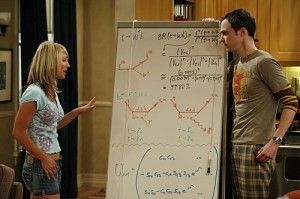Big Bang Theory
How obnoxious is too obnoxious for a TV character?
Big Bang Theory’s Sheldon means no harm, but he’s still a jerk
That Dang Bang BIG BANG
There’s a very fine line between lovable sociopath and just plain sociopath
TV Premiere Week: Thursday
What you should and shouldn’t watch tonight
Killing Captain Kirk
A show-stopping visit to Banff last week confirms no one’s mocking William Shatner anymore
Who Are You Calling a Dummy?
The second and third-most-popular CBS comedies had a little too much of, respectively: Penny/Leonard (can’t they just leave him at the North Pole and give Penny and Sheldon more time for hilarious bits like the door-knocking routine?) and Ted (not a bad episode, but why spend a whole half-hour on a relationship nobody cared about and a creepy, self-loving lead character who pities himself because true love hasn’t come to him by the time he’s 30?).
Is Jim Parsons a Supporting Actor?
Noel Murray at the AV Club has an interview with Jim Parsons (the thinking man’s Jaleel White), an excellent interview that places particular emphasis on the multi-camera, live-audience format and the role of the audience as a sixth character on the show.
“You Have No Idea How to Play Bridge, Do You?”
Tonight’s How I Met Your Mother was the kind of episode I like, after a batch of episodes that have had entertaining moments but haven’t really been my style. (This was a sequel to last week’s episode, “Sorry, Bro,” and while that episode had its admirers, I thought the story was a bit pointless and way too heavy on scenes with no other regulars besides Ted.) This has been an uneven season, but when the show gets a story that really works, it reminds me why it’s still my favourite comedy: because it gets comedy and storylines out of every character’s relationship with every other character, and tries to take familiar relationships in unexpected but appropriate directions. In this case, the fact that Lily has been responsible for breaking up Ted’s unsuitable relationships, including his second-season breakup with Robin, is true to what we know about her, but expands on it.
First Addition
Adding new regulars to a comedy can be tricky. Not dramas; today’s dramas at least, are more or less built to accommodate the coming and going of characters; you expect that they’ll add a regular or two every year and, on some shows like Lost, drop almost as many regulars as they add. But because a comedy is usually based around a relatively small core group, adding a new person to that group is usually taken as a sign of desperation, an admission that something wasn’t working the first time around or that the network is meddling. When a drama adds a new regular in the second season, it’s a normal occurrence; when a comedy adds a new regular, it’s usually because the original cast just didn’t quite cut it. Call it the Steve Urkel Theory of Comedy Casting: any character added as a regular to a comedy is added to make up for some deficiency in the regular cast.



